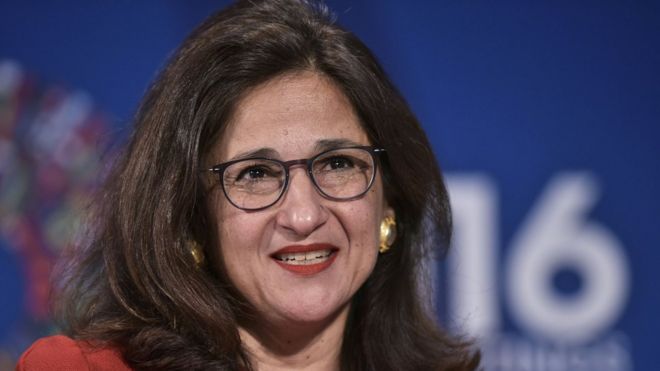 GETTY IMAGES
GETTY IMAGES
The Bank of England may see its first female governor in over 300 years if the current government remains in power after the general election in December.
The BBC understands that Egyptian-born Dame Minouche Shafik is the current government's favoured candidate to succeed Mark Carney when his term ends in January of next year.
However, the government feels it would be inappropriate to name a successor to one of the most important economic posts in the UK before the results of the election on 12 December.
A change of government in December would see a change in chancellor - the person who recommends the choice of governor.
The role of governor of the Bank of England is one of the most powerful positions in the UK. The bank is responsible for setting interest rates and policing the stability and behaviour of the UK's financial sector.
Although the governor is only one of a committee of nine people who set interest rates, he or she wields enormous influence over the way the UK's financial system is run.
Given the UK's position as arguably the world's most important financial centre, the job comes with global influence.
Dame Nemat Talaat Shafik, who is 57 and more commonly referred to as Minouche, has already served as a deputy governor of the bank and is currently director of the London School of Economics.
Other candidates for the role include Andrew Bailey, chief executive of the Financial Conduct Authority; Shriti Vadera, chair of Santander UK; and Ben Broadbent, Jon Cunliffe and Paul Tucker - all former or current deputy governors at the Bank.
Hawk or dove?
One former Bank of England insider told the BBC "she would be a very popular appointment internally. She has very good people skills which not all the other candidates do."
The most important question perhaps is whether this potential new governor is seen as a "hawk" or a "dove".
A hawk is someone who would rather raise interest rates early to head off inflation by increasing the cost of loans to discourage borrowing and spending.
A dove is someone who would rather wait and see whether cheap borrowing really leads to debt-fuelled spending before raising the rates at which consumers and home buyers can borrow.
Dame Minouche - who received her damehood in 2015 - has described herself in the past as an "owl" who would be "wise" when setting the rates at which we all borrow.
The incumbent government may have chosen its preferred governor. But it would perhaps be unwise to assume whether it gets to make that call.
No comments:
Post a Comment